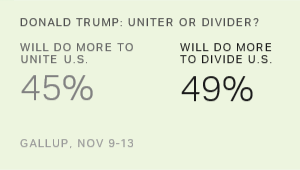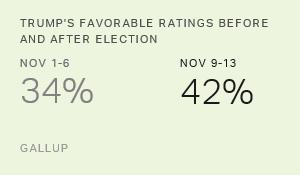PRINCETON, N.J. -- As is true for any presidential candidate, Donald Trump made a significant number of promises throughout his more-than-yearlong campaign for the presidency. With less than two months to go before he takes office, Trump now faces the challenges of figuring out how to implement his proposals.
One such challenge concerns public opinion: Some of his proposed policies and actions are in sync with majority public opinion, while others are not. This matters. It's certainly easier to take action on policies with which the public agrees than on those the public opposes.
I've put together a number of Trump's proposed policies and grouped them into three categories: those that appear to be largely in sync with American public opinion, those that are clearly out of sync and those on which the public is divided. In all instances, I'm referring to public opinion among the population taken as a whole. Clearly, some policies have a special appeal -- or a particular lack of appeal -- to smaller segments of the population. But the newly elected president is president for all of the people, not just those who voted for him, and in that sense, it is important to chart how his policies stand up to national public opinion.
Many of Trump's proposals involve complex issues, and some involve issues about which the majority of the public is still forming opinions. But these data, collated from a number of ������ surveys over the past year, give us revealing indications of how the public reacts to each.
Proposed Trump Policies Largely in Sync With Public Opinion
1. Lower taxes on the middle class
Trump's proposal: "Massive tax reduction … The largest tax reductions are for the middle class. A middle-class family with two children will get a 35% tax cut."
The proposal to cut taxes for the middle class generally fits with current American public opinion about taxes. ������'s April annual update measuring Americans' views shows that more Americans than at any point in the past 15 years say their tax bill is too high. Additionally, 53% of Americans say that middle-income people pay too much in taxes, also up from recent years. The 46% who say that lower-income people pay too much is also the highest in eight years.
2. Simplify taxes
Trump's proposal: "The current number of brackets will be reduced from seven to three, and tax forms will likewise be greatly simplified."
A March ������ survey tested an earlier variant of this proposal -- "simplifying the federal tax code into four tax brackets instead of the current seven" -- and found that by four to one, Americans with an opinion supported the idea. Forty-one percent didn't have an opinion on the issue, however, suggesting that opinions could shift as more specifics of this type of proposal become known.
3. Spend on infrastructure
Trump's proposal: "American Energy & Infrastructure Act. Leverages public-private partnerships, and private investments through tax incentives, to spur $1 trillion in infrastructure investment over 10 years."
The general idea of spending more federal money "to improve infrastructure, including roads, buildings and waterways" receives strong public approval: 75% of Americans say they agree with this proposal, while 11% disagree.
4. Term limits for members of Congress
Trump's proposal: "Propose a Constitutional Amendment to impose term limits on all members of Congress."
This idea has very strong support from Americans, underscoring the very negative views the public has of Congress and its members. A September 2015 ������ poll found 71% of Americans supporting passing a law that would limit the number of terms that members of Congress can serve. A 2013 ������ poll found 75% supporting such a law. In 1994, the idea of term limits was introduced as part of the Republicans' "Contract with America," and at that point, a similar 73% of Americans supported the idea.
5. New ethics rules for members (and ex-members) of Congress in D.C.
Trump's proposal: "A five-year ban on White House and Congressional officials becoming lobbyists after they leave government service; a lifetime ban on White House officials lobbying on behalf of a foreign government; a complete ban on foreign lobbyists raising money for American elections."
Americans have very little regard for members of Congress, giving them the second-lowest honesty and ethics ratings of any profession tested -- one point above lobbyists. Over half of Americans rate the job being done by Congress as "poor" or "bad." ������ analysis shows that behind these low ratings of Congress are strong views that members of Congress pay too much attention to financial interests, contributors and lobbyists. It follows that any proposal to impose restrictions on the connection between members or ex-members of Congress and lobbyists would receive approval from Americans.
6. Rebuild the military
Trump's proposal: "Restoring National Security Act. Rebuilds our military by eliminating the defense sequester and expanding military investment."
A majority of Americans (52%) agree with a proposal to increase federal spending on the U.S. military. Additionally, Americans have more confidence in the military than in any other institution ������ tests, underscoring a presumed popularity of the idea of increasing investment in the military. The percentage of Americans who -- in response to a three-part question asking about the amount of money the government should spend for national defense and military purposes -- say that more should be spent, although below the majority level, is at its highest point since 9/11. By a slight margin, in response to a different question, more Americans say the military is "not strong enough" than say that it is "about right" or that it is "stronger than it needs to be."
7. Improve services for veterans
Trump's proposals: "Provides veterans with the ability to receive public VA treatment or attend the private doctor of their choice." … "Make the VA great again by firing the corrupt and incompetent VA executives who let our veterans down, by modernizing the VA, and by empowering the doctors and nurses to ensure our veterans receive the best care available in a timely manner."
Americans strongly agree with several proposals to improve the situation for veterans in the U.S., including allowing veterans to get healthcare from any provider that accepts Medicare -- not just the Department of Veterans Affairs -- and spending more money modernizing the VA.
A 2014 ������ poll found that 87% of Americans favored improving the way healthcare services were provided to military veterans, topping the list of priorities tested in that survey.
Proposed Trump Policies Generally Out of Sync With American Public Opinion
1. Lower taxes on higher-income Americans
Trump's proposal: Reduce taxes across the board.
Trump has said that he wants to ensure that the rich will pay their fair share in taxes, and his newly selected treasury secretary says that there will be no "absolute" tax cut for the wealthy because eliminating deductions would offset lower tax rates. But taken at face value, Trump's proposed "across the board" tax plan would clearly lower taxes on high-income Americans if he does not alter it.
Six in 10 Americans believe higher-income Americans pay too little in income taxes. A slight majority agree that the government should redistribute wealth by "heavy taxes on the rich." Plus, 45% of Americans agree with a proposal to "raise federal incomes tax rates on households earning over $250,000 per year."
Any tax plan Trump proposes is out of sync with American public opinion to the degree that the rich and wealthy end up paying less, rather than more, taxes.
2. Build a wall between Mexico and the U.S.
Trump's proposal: "Fully funds the construction of a wall on our southern border with the full understanding that the country Mexico will be reimbursing the United States for the full cost of such wall."
When asked directly about this proposal in a September 2015 ������ survey, 51% of Americans disagreed with the idea of "using money obtained from issuing visas to Mexican immigrants to help pay for a wall on the U.S.-Mexico border." And, when asked this summer in a separate survey about building a wall along the entire U.S.-Mexico border, 66% of Americans said they opposed it.
3. Deportations
Trump's proposal: "Begin removing the more than 2 million criminal illegal immigrants from the country and cancel visas to foreign countries that won't take them back." … "Anyone who enters the U.S. illegally is subject to deportation. That is what it means to have laws and to have a country." … : "Donald Trump has repeatedly vowed to round up and deport the estimated 11 million people in the country illegally, sometimes saying he would eject them all in two years."
Trump's proposals on exactly what he will do with immigrants living in this country illegally have changed more recently, with an increased emphasis on the subset of immigrants who have criminal records. But generally, Americans generally favor a pathway to citizenship for immigrants living in this country rather than immediate deportation. In one ������ survey, 84% said they favor allowing immigrants living in this country illegally to have a pathway to citizenship if they meet certain requirements.
A separate question offering three alternatives also found about two-thirds of Americans favoring a pathway to citizenship for those who meet certain requirements over time, as opposed to allowing them to stay for a brief period or sending them home immediately.
An April ������ survey used somewhat stronger language, testing a proposal to "pass legislation providing a swift and fair roadmap to citizenship for the 11 million undocumented immigrants living in the U.S." The word "swift" may have lowered the positive responses compared to the other questions, but the results showed that a plurality of Americans (45%) agreed with this proposal, while 38% disagreed.
4. Governmental emphasis on fossil fuels
Trump's proposal: "I will lift the restrictions on the production of $50 trillion dollars' worth of job-producing American energy reserves, including shale, oil, natural gas and clean coal."
������'s annual environmental survey conducted in March showed that when given a choice, 73% of Americans put a higher priority on focusing on alternative energy sources than on traditional fossil fuel sources. Additionally, a separate ������ question asked in March found that a majority of Americans (59%) placed a higher priority on preserving the environment than on the development of traditional energy sources such as oil, gas and coal. This is the highest percentage favoring the environment over the development of traditional energy sources in the 15 years in which ������ has asked this question.
Only 31% of Americans predict a critical energy shortage in the next five years, the lowest percentage on record.
Proposed Trump Policies With Divided American Public Opinion
1. Repeal and replace the Affordable Care Act
Trump's proposal: "Repeal and Replace Obamacare Act. Fully repeals Obamacare."
Only a minority of Americans, 37%, both disapprove of the Affordable Care Act ("Obamacare") and say in turn that it should be repealed and replaced. But another 43% either approve or disapprove of the law and want it changed significantly. Fourteen percent approve of the Affordable Care Act and want it left as it is.
The conclusion: Trump is in sync with the general sentiment of the public that changes to the Affordable Care Act are needed, but not in sync when it comes to his specific recommendation that the law is repealed and replaced.
2. Hiring freeze
Trump's proposal: "A hiring freeze on all federal employees to reduce federal workforce through attrition (exempting military, public safety, and public health)"
The federal government is held in very low esteem by Americans, with significantly higher negative opinions than positive ones. This suggests there may be support for the idea of freezing the size of the government. A ������ survey in March tested a more draconian variation of this proposal -- "three government employees leave the federal government before the government can hire one new employee" -- and found mixed support, with about as many saying they disagreed as agreed.
3. End Common Core
Trump's proposal: "End Common Core" … "I believe Common Core is a very bad thing."
A March ������ survey asked Americans simply if they agreed or disagreed with the proposal to "end Common Core." The results show that the majority of Americans don't know enough about it to have an opinion (51%), but among those who do, 31% agree and 17% disagree. This proposal is thus neither in sync nor out of sync with public opinion because so many Americans don't have an opinion on the complex issue.
4. Move the U.S. Israeli embassy to Jerusalem
Trump's proposal: "I think moving the embassy to Jerusalem is an important step toward putting Jerusalem as the capital of Israel."
������ asked the public to weigh in on the proposal to "recognize Jerusalem as the capital of Israel and move the U.S. embassy to Jerusalem from Tel Aviv" -- and revealed an ambivalent public. Over half have no opinion when asked this question, and of those who have an opinion, the proposal breaks about even: 24% agree, while 20% disagree.
5. Withdraw from NAFTA and TPP
Trump's proposal: "I will announce my intention to renegotiate NAFTA or withdraw from the deal under Article 2205 … I will announce our withdrawal from the Trans-Pacific Partnership."
Asked in September 2015 about proposals to "end U.S. participation in free trade deals, such as NAFTA and the Trans-Pacific Trade Agreement," Americans with an opinion were divided right down the middle, with 28% agreeing and 28% disagreeing. Over four in 10 didn't have an opinion.
At the same time, there are some indications of a more negative reaction to the idea of withdrawing from the treaties. Asked separately about the economic effect of withdrawing from the treaties, few Americans (16%) thought the decision would be "very effective" in improving the U.S. economy.
More generally, a longstanding ������ survey question shows that over the past three years, a majority -- 58% in the latest survey conducted this year -- have said that foreign trade is an opportunity for economic growth rather than a threat to the economy.
6. Less government regulation
Trump's proposal: "A requirement that for every new federal regulation, two existing regulations must be eliminated."
Almost half of Americans say there is too much government regulation of business and industry, but the rest are divided between the views that there is too little or the right amount of government regulation.
A separate question in 2016 found that a majority of Americans (55%) were dissatisfied with government regulation of business and industry, but of those who said they were dissatisfied, less than half (25%) wanted regulation decreased.
These findings show public ambivalence about federal regulations, suggesting that the long-term reaction to significant cuts in regulations that would result from Trump's proposals remains to be seen.
7. Lower business tax rate
Trump's proposal: "The business rate will be lowered from 35% to 15%, and the trillions of dollars of American corporate money overseas can now be brought back at a 10% rate."
In March, Americans tilted toward agreeing with the idea of lowering the federal corporate tax rate to 15%, with 43% agreeing and 30% disagreeing.
A separate question asked in May found 77% of Americans agreeing with the idea of lowering the tax rate on small businesses. This underscores the deeply positive sentiments the public has toward small businesses, found across a number of measures.
On the other hand, ������'s annual April survey on the economy showed two-thirds saying that corporations pay too little in taxes. The overall reaction to cuts in the business tax rate may depend on how they are positioned and what sizes of business are most affected.


